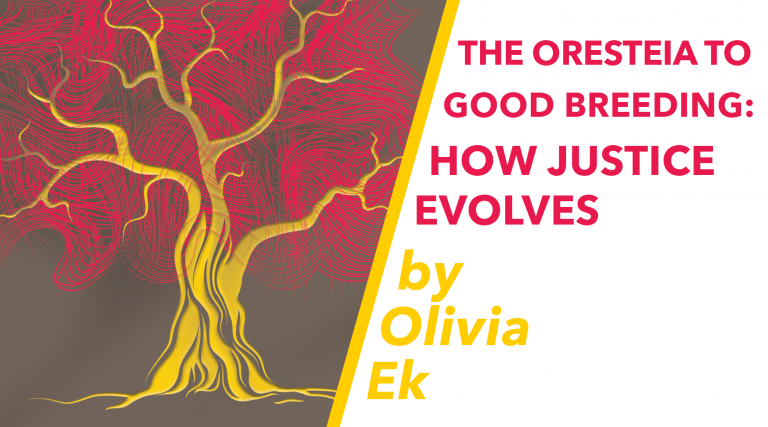Dramaturg’s Note | Everybody
By Elena Freck, Production Dramaturg (Everybody)
What do a critic at the 1496 Antwerp Landjuweel theatre festival, a 15th century English Catholic churchgoer, and an audience member of Emerson Stage’s 2021 production of Everybody have in common? We’re all seeing a version of the same story.
Sometime around the year 1470, a Dutch author named Peter van Diest wrote Den Spevghel der Salicheyt van Elckerlijc, a morality play about an allegorical Everyman who is called before God to answer for the sins of humanity. Before he goes, Everyman approaches other allegorical characters like Fellowship, Kindred, Goods, Strength, Discretion, and Beauty to accompany him on his journey. Near the end of the play, Knowledge brings Everyman to Confession so he can repent for his sins, and Everyman learns that no one but his Good-Deeds can escort him to his grave. In the decades following the publication of the Dutch play Elckerlijc, an unknown playwright adapted it for the English church, and nowadays, The Summoning of Everyman is the best-known English play prior to Shakespeare.
In England during the 15th century, good Catholics attended plays in complement to their worship practice, and good plays reflected and reaffirmed the teachings of the church. Plays were performed wherever there was room for an audience, and each had a clear didactic purpose. Everyman is a play about Christian salvation, and what one must do to achieve it. It teaches that God is vengeful, Death is his willing servant, and earthly confession is the only way to scourge oneself of sin and reach heaven in the afterlife. Beyond its utility as a religious tool, however, there remains universal truth to be found in Everyman. It is a serious contemplation of family, friendship, service, and material wealth, all themes that transcend the bounds of Christianity. In fact, it is likely that the Dutch version, Elckerlijc, drew inspiration from traditional Buddhist fables about the afterlife. With each new version of the story came updates that suited the audience for which it was performed. When playwright Branden Jacobs-Jenkins adapted Everyman into Everybody in 2017 he made many such changes.
Many of Everybody’s major updates are a response to the transition from a monolithic belief in God in 15th century England to pluralism and wide atheism and agnosticism in the modern United States. Everybody is a secular play. It includes God as a character, but this God is very different from the traditional Christian deity. Audiences will see many characters in Everybody respond with surprise to the revelation that God is real. They will also see a God that is not vengeful, not punishing, but rather critical of herself because of how much she loves humanity. Everybody’s God accepts the blame for the degeneration of humanity, and summons Everybody in order to learn how to reverse this deterioration. In contrast, the original God in Everyman blames humanity for their own decay, and requires Everyman to repent for his sins to achieve salvation. This retaliatory nature is apparent in God’s first monologue in Everyman, which actor Kandyce Whittingham performs here.
The names and personalities of the allegorical characters whom Everybody approaches for help also constitute a major change from the source text. Fellowship becomes Friendship, Discretion becomes Mind, Five-wits becomes Senses, and in one of the more interesting adaptations, Goods becomes Stuff. As one might imagine, 21st century Americans have a drastically different relationship to material goods than 15th century Englanders. When Everyman premiered, the European economy was still recovering from the devastating impacts of the Black Plague. The merchant and trade system was beginning to blossom, but England remained a largely agrarian economy, and most churchgoers lived with just enough. Thus, Everyman’s Goods encourages a healthy relationship with material goods that involves moderate consumption and giving to the poor. In Everybody, Stuff makes no mention of moderation, and instead emphasizes its own gargantuan size. Stuff is also much more self-aware than Goods; the modern character deals with problems of consciousness and morality, including guilt surrounding how desire for Stuff destroys human lives. Stuff embodies all the negative elements of 21st century American consumerism, and is a much more extreme version of its predecessor.
Finally, many of Jacobs-Jenkins’ adaptations address the transition from a general understanding of humanity as fundamentally collective to our current cultural emphasis on individuality. The idea that there could be one singular representative for all of humanity seems much stranger now than it would have seemed to 15th century Catholics. To tackle this incongruity, Everybody introduces the Somebodies—five actors who rotate the roles of Everybody and their allegorical companions. Beyond the random selection of the Somebodies each performance, Everybody also does not pretend to speak for all of humanity. Unlike the original Everyman, the modern Everybody understands that everyone will have to individually reckon with God in their own time—Kinship actually cites this as a reason why they cannot accompany Everybody to the reckoning. The other Somebodies also regularly check Everybody’s sense of self-importance, emphasizing that Everybody is not special, it is simply their time to reckon before God.
In its original incarnation, Everyman had one purpose: to teach its audience about the dangers of sinning, and how to achieve Christian salvation. Branden Jacobs-Jenkins’ Everybody takes the bones of that story and transforms it into a modern meditation on theatre history, love, death, and understanding. It just goes to show, some stories are worth repeating.
If you are interested in reading the original English Everyman, you can do so here: https://sourcebooks.fordham.edu/basis/everyman.asp

